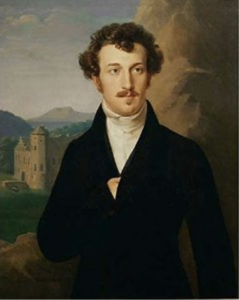By the little stream in spring
(Poet's title: Am Bach im Frühlinge)
Set by Schubert:
D 361
[1816]
Du brachst sie nun, die kalte Rinde,
Und rieselst froh und frei dahin,
Die Lüfte wehen wieder linde,
Und Moos und Gras wird neu und grün.
Allein, mit traurigem Gemüte
Tret ich wie sonst zu deiner Flut,
Der Erde allgemeine Blüte
Kommt meinem Herzen nicht zu gut.
Hier treiben immer gleiche Winde,
Kein Hoffen kommt in meinen Sinn,
Als dass ich hier ein Blümchen finde,
Blau, wie sie der Erinnrung blühn.
You have broken it now, that cold crust,
And you are rippling onwards freely and merrily.
The breezes are blowing soothingly again,
And the moss and grass are becoming new and green.
Alone, in a sad mood,
I trudge towards your waters as before.
The general blossoming of the Earth
Is not doing my heart any good.
Here it is the same prevailing winds that continue to blow,
No hope enters my mind
Other than that I might find a small flower here:
Blue, like those that bloom in my memory.
All translations into English that appear on this website, unless otherwise stated, are by Malcolm Wren. You are free to use them on condition that you acknowledge Malcolm Wren as the translator and schubertsong.uk as the source. Unless otherwise stated, the comments and essays that appear after the texts and translations are by Malcolm Wren and are © Copyright.
☙
Themes and images in this text:
Being solitary, alone and lonely Blue Breaking and shattering By water – river banks The earth Floods and tides Flowers Forgetting Frost and ice Grass Green Hearts Hope Melancholy Moss Rivers (Bach) Spring (season) Wind
Sometimes nature seems to be cruelly out of step with what matters to us. Bird song and the scent of spring blossom can strike us as a direct assault. What makes the stream think that it can now ripple along merrily rather than remain as cold and unmoving as our own inner life? Spring might have sprung, but if we feel that we are never going to bounce back then our alienation from our environment can only make us more gloomy.
It is not just the disjunction between the outside world and our inner reality that hurts. The rejuvenation of spring is all about hope and the future. Nests are being built, buds are opening, everything seems to be goal orientated. Everything except me. For me, what still matters is the past. Unlike the stream, now flowing towards a destination in some future sea or ocean, my thoughts (more a ‘frozen lake’ than a ‘stream’ of consciousness) are stuck, unable to move on. I am a prisoner of memory.
Schober presents the distinction between the blossoming outer world of springtime and the stagnant inner melancholy using the symbolism of green versus blue. In his world ‘feeling blue’ was not a general way of referring to depression as it already was for contemporary English speakers (some of whom complained that they suffered from ‘the blue devils’). Rather it evoked the quest for the unattainable, the dream of perfection in ‘the blue flower’. This image was central to Novalis’s novel Heinrich von Ofterdingen (published in 1802)[1] and in the following generation it would be taken up by the early Romantic poets in the German speaking world (including Mörike´s Er ist´s and Wilhelm Müller´s Tränenregen from Die schöne Müllerin). For Schober here the blue flower has something to do with the ideal that prevents us from taking action since we are bound to fall short, it is the Platonic form to which we say that we long to attain but which prevents perfectionists from completing any project. The memory of a fleeting vision of perfection has left some of us frozen. Will we be able to break through our cold, icy crust and let the stream flow again?
[1] Penelope Fitzgerald’s 1995 novel The Blue Flower brings Novalis to vivid life
☙
Original Spelling Am Bach im Frühlinge Du brachst sie nun, die kalte Rinde, Und rieselst froh und frei dahin; Die Lüfte wehen wieder linde, Und Moos und Gras wird neu und grün. Allein, mit traurigem Gemüthe Tret' ich wie sonst zu deiner Fluth, Der Erde allgemeine Blüthe Kommt meinem Herzen nicht zu gut. Hier treiben immer gleiche Winde, Kein Hoffen kommt in meinen Sinn - Als daß ich hier ein Blümchen finde, Blau, wie sie der Erinnrung blühn.
Confirmed by Peter Rastl with Gedichte von Franz von Schober, Stuttgart und Tübingen, J.G.Cotta’scher Verlag, 1842, page 9.
Note: Schubert received all poems from Schober in handwritten form. A (possibly later) autograph of this poem with the title Am Bach im Frühlinge is kept in the Vienna City Library.
To see an early edition of the text, go to page 9 [27 von 292] here: http://digital.onb.ac.at/OnbViewer/viewer.faces?doc=ABO_%2BZ20766660X


